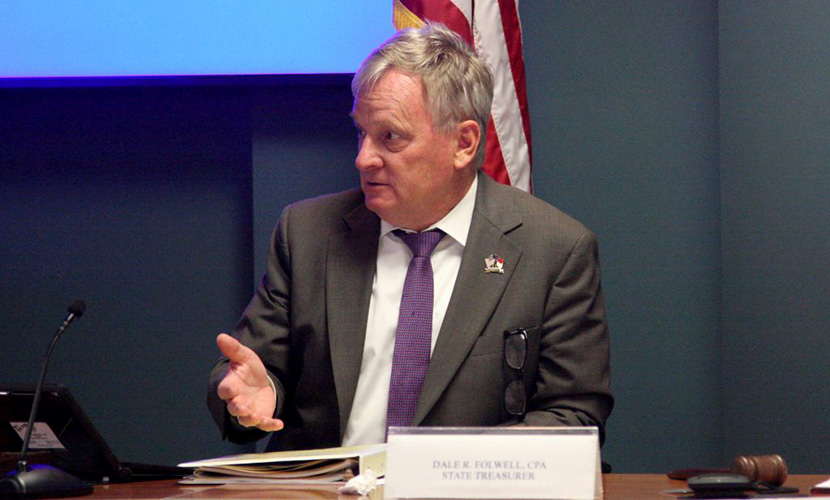Publisher's note: This post appears here courtesy of the Carolina Journal, and written by Dan Way, Associate Editor.
State Treasurer Dale Folwell. (CJ photo by Dan Way)
Fresh off N.C. Department of Insurance approval of cost-reducing reforms, Treasurer Dale Folwell is optimistic doctors and hospitals will join a new State Health Plan provider network. Contracts were set to go out late last week.
The Insurance Department green light was the last regulatory hurdle to implement his Clear Pricing Project and change the State Health Plan's payment structure, Folwell told reporters during his monthly teleconference Tuesday, May 7.
The State Health Plan Network is a reference-based pricing model that will replace the commercial insurance system. The network will reimburse physician services at 182% of the federal Medicare rate. Rural hospitals would receive 200% of Medicare reimbursement rates.
Taxpayers could save $258 million, and plan members $57 million annually. Some co-pays and deductibles would be eliminated. The goal is to freeze premiums when the new plan kicks in Jan. 1, 2020, and possibly lower family premium costs.
Nearly 90% of primary care physicians would get a pay increase. The raises would range between 5% and 30%, Folwell said. Mental health providers also will get increases.
Specialists likely would see lower rates, Folwell said. Some currently make 700% to 900% above Medicare rates. Payments may instead be 300% above Medicare.
Details on premium costs and reimbursement rates will be available as contract language is finalized, Folwell said. Providers would have until June 30 to return signed contracts.
But his efforts are
being attacked in advertisements by Partners for Innovation in Healthcare, an affiliate of the N.C. Healthcare Association, the hospitals' lobbying arm. The hospitals pushed lawmakers to introduce
House Bill 184. It would derail Folwell's plan, and preserve the status quo while a study committee examines State Health Plan woes and potential reforms.
The House-passed bill stalled in the Senate Rules Committee. Folwell said doesn't know if the bill will gain any traction in the Senate. Senate leader Phil Berger, R-Rockingham, has told
Carolina Journal he is reluctant to interfere with the treasurer's statutory responsibility for the State Health Plan.
Folwell said hundreds of doctors have driven from across North Carolina to informational meetings in Raleigh, or contacted his office about joining the new network.
They see the change as a way to make more money, stay in business, avoid pressure to join a large hospital conglomerate and possibly pass their independent practice on to a younger doctor.
Folwell said reform is urgent. The State Health Plan is only 3% funded, has $35 billion in unfunded liabilities, and will exhaust its reserves in 2-1/2 years.
Meanwhile, Montana reduced its state health plan costs dramatically after indexing payments to Medicare rates. A similar change in North Carolina could save as much as half a billion dollars.
"Montana's results suggest the North Carolina State Health Plan and state employees could save even more than State Treasurer Dale Folwell has estimated with the introduction of reference-based prices," said Joe Coletti, senior fellow at the John Locke Foundation specializing in tax and fiscal policy.
Coletti based his estimate on budget data given to
Carolina Journal by Montana's Health Care and Benefits Division, which oversees its state health plan. It shows in 2017 Montana saved 19 percent compared to $70 million in health spending forecast under its PPO plan.
Scaling up Montana's results to North Carolina's $3.4 billion spending level indicates a savings of more than $500 million a year, Coletti said. That's more than double the $241 million savings The Segal Company
projected in a legislative actuarial note.
Other factors can complicate a direct comparison between the two systems, Coletti said. They include geography, age and health status of the population, culture and lifestyle, and quality of care.
Montana has just over 1 million residents, and 28,500 members on its state health plan. North Carolina's population is 10.5 million people. The State Health Plan covers more than 720,000 employees and retirees. Both states have self-funded health insurance plans administered by a third party.
Duane Preshinger, administrator of Montana's Health Care and Benefits Division, said his office and the state legislature are pleased with the switch to reference-based pricing.
Preshinger said Montana immediately saved $4.6 million in the last six months of 2016 by switching to reference-based pricing.
Preshinger is not surprised North Carolina hospitals have balked at Folwell's plan. Several hospitals resisted change when Montana converted to the cost-cutting system.
One analysis determined Montana's outpatient costs had varied by facility anywhere from 200% to more than 500% over Medicare pricing.
The reference-based pricing scheme reimburses all hospitals equally, and limits annual cost increases, Preshinger said. Consistent pricing is a plus for the state. Under the previous arrangement medical facilities controlled annual price increases.
























